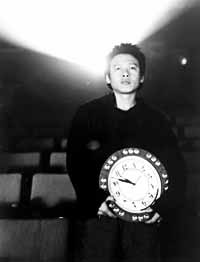What Time is it There?
2001, R, 116 min. Directed by Ming-liang Tsai. Starring Kang-sheng Lee, Shiang-chyi Chen, Yi-Ching Lu, Tien Miao, Jean-Pierre Léaud, Cecilia Yip.
REVIEWED By Kimberley Jones, Fri., April 26, 2002

Like a peevish schoolgirl, harrumphing for recess, wondering when it's gonna get good, my initial assessment of What Time Is It There? was to brand it cinematic broccoli -- probably good for me, but still tough to swallow. That sort of declaration does a disservice to both broccoli and Tsai Ming-Liang's Taiwanese film, but it's not an uncommon reaction to something foreign -- befuddlement, boredom, dismissal. And What Time Is It There? is nothing if not foreign, but not in the sense of national demarcations of language and custom. It speaks a different cinematic language, one that tosses off the usual rules of camerawork and narrative structure. That's the language -- that of tracking shots and deep focus and three-act plotting -- that contemporary audiences know like their ABCs, even if it's entirely unconscious. It's only when that deeply embedded language is removed that viewers begin to understand how fluent they are in the former, how hopelessly lost in the latter. Taipei director Tsai uses a fixed camera, low to the ground, that doesn't shift when a character ducks out of the frame for a smoke or a dish from the kitchen. It stays put. You stay put, too. It's a condition that calls for extreme patience -- not that you don't already do this in your own lives, stare dumbly at the quotidian details without getting the least bit anxious or wondering what's going to happen next -- but by god, this is a movie! How can we not? Be patient. Tsai's characters certainly are. They move through the film as if stuck in something thick and viscous -- appropriate as two are in mourning in Taipei, one is a foreigner in Paris, and a profound isolation links the three. A death begins the film. We see the dead man's son, Hsiao Kang (Lee Kang-sheng), holding the ashes in the backseat of a car, murmuring to his father's spirit that they are about to go though a tunnel, he'll have to follow. That exchange sets up the rest of the film: Tsai goes where he wants to go -- rarely where we're expecting -- and we'll just have to follow. Where he goes is into the intimate devastations of the three leads (all Tsai regulars): Hsiao Kang, a sidewalk watch salesman; his mother (Lu Yi-Ching), desperate for any sign of her husband's reincarnation; and the lovely Shiang-Chyi (Chen Shiang-Chyi), who buys the watch off Hsiao Kang's wrist and travels to Paris, where she doesn't know the language or the people. Hsiao Kang becomes obsessed with the idea of her and her exotic journey, watching over and over a bootlegged copy of Truffaut's The 400 Blows and setting every clock he finds to Paris time (a running joke that supplies the most lighthearted and charming imagery of the film). The 400 Blows is no accident -- Tsai calls it his “all-time favorite movie” -- and that film's scarred hero, Antoine Doinel (Jean-Pierre Léaud), actually appears briefly on a bench in Paris, slipping his phone number to Shiang-Chyi, ever the romantic scamp. Léaud's presence doesn't really further the plot -- honestly, not much here does -- but it serves as a thematic link between the two films, both so concerned with the poignant pain of loss and abandonment, of failed human connection. But just like Truffaut's masterwork, Tsai finds the playfulness in the pain, in surreal sight gags -- a fish lazily eating a cockroach -- and an amusing preoccupation with bodily functions, like Ozu with a scatological complex. They help to puncture the film's languidness, but in the end, the patience pays off in a dramatic, masterful scene of cross-cutting between the three lost souls, each seeking sexual gratification -- two with strangers, one with masturbation that plays like the tender lovemaking between a besotted, brokenhearted wife and her departed husband. None of them are really satisfied; as a viewer, I'm not positive I am either. The three will still wake up alone, but maybe, with patience, things will eventually work out. But there's no use worrying, wondering when it's gonna get good for them. Tsai isn't telling.
A note to readers: Bold and uncensored, The Austin Chronicle has been Austin’s independent news source for over 40 years, expressing the community’s political and environmental concerns and supporting its active cultural scene. Now more than ever, we need your support to continue supplying Austin with independent, free press. If real news is important to you, please consider making a donation of $5, $10 or whatever you can afford, to help keep our journalism on stands.
April 19, 2024
April 19, 2024
What Time is it There?, Ming-liang Tsai, Kang-sheng Lee, Shiang-chyi Chen, Yi-Ching Lu, Tien Miao, Jean-Pierre Léaud, Cecilia Yip









